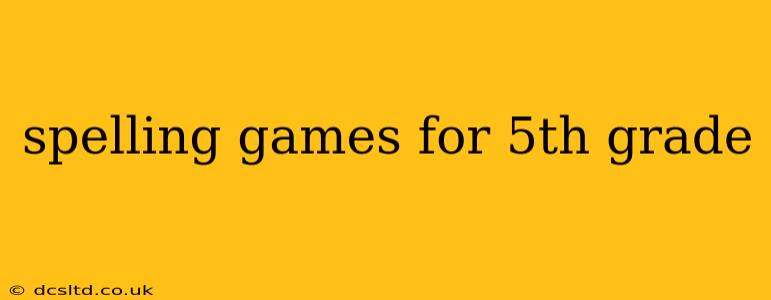Fifth grade marks a crucial stage in a child's spelling development. Moving beyond basic phonetic rules, students encounter more complex word structures, prefixes, suffixes, and root words. Engaging spelling games can transform this challenging phase into an enjoyable learning experience, strengthening spelling skills while building confidence. This guide explores various games and strategies perfect for fifth graders, ensuring learning remains fun and effective.
What are some fun spelling games for 5th graders?
Fun shouldn't be sacrificed for learning! Many engaging games cater to various learning styles and preferences. Here are some ideas:
-
Spelling Bee with a Twist: Instead of the traditional format, incorporate themes. For instance, a "Science Spelling Bee" focusing on vocabulary related to science concepts, or a "Historical Figures Spelling Bee." This adds context and makes learning more relevant.
-
Board Game Adaptations: Transform classic board games like Scrabble or Boggle to focus on spelling. Use age-appropriate word lists or create your own based on current curriculum.
-
Charades or Pictionary (Spelling Edition): Students act out or draw words, challenging their classmates to spell them correctly. This taps into visual and kinesthetic learning.
-
Spelling Bingo: Create Bingo cards with spelling words. Call out the words, and students mark them off. The first to get Bingo wins!
-
Sentence Scramble: Provide students with a jumbled set of words. They must arrange them to form a grammatically correct sentence, focusing on accurate spelling.
-
Online Spelling Games: Numerous websites and apps offer interactive spelling games, many tailored to specific grade levels. These often feature points, rewards, and competitive elements to keep children motivated.
What are some good spelling games for 5th graders to play at home?
Home-based learning can reinforce classroom activities. These games make learning fun and accessible outside school:
-
Family Spelling Tournament: Turn spelling practice into a family affair! Create a competitive yet supportive environment.
-
DIY Spelling Board Game: Get crafty and design a custom board game focusing on spelling. This personalizes the experience and adds a creative element.
-
Flashcard Fun: Traditional flashcards remain a valuable tool. Try different methods like using picture cards to represent words or using flashcards with definitions and example sentences.
-
Storytelling Challenge: Have children create a short story using a specific list of spelling words. This encourages creative writing alongside spelling practice.
-
Word Search Puzzles: Create personalized word search puzzles incorporating challenging spelling words.
How can I make spelling games more engaging for 5th graders?
Engagement is key to successful learning. Consider these strategies:
-
Incorporate Technology: Use interactive whiteboards, tablets, or computers to make the learning experience more dynamic and visually appealing.
-
Teamwork: Encourage collaboration and teamwork through group spelling activities.
-
Rewards and Incentives: Positive reinforcement, such as small rewards or privileges, can motivate students.
-
Variety: Rotate through different games and activities to prevent boredom and cater to different learning styles.
-
Personalization: Tailor the games to the students' interests and the words they struggle with.
What are some tips for teaching 5th graders spelling?
Effective teaching strategies are crucial for success. Consider:
-
Focus on Root Words, Prefixes, and Suffixes: Understanding these elements greatly aids in spelling more complex words.
-
Use Multi-Sensory Techniques: Incorporate visual, auditory, and kinesthetic activities.
-
Provide Regular Practice: Consistent, shorter practice sessions are more effective than infrequent, longer ones.
-
Provide Feedback: Offer constructive criticism and positive reinforcement.
-
Encourage Self-Correction: Help students develop strategies for self-checking their work.
By incorporating these fun and effective spelling games, fifth graders can enhance their spelling skills, build confidence, and make learning a genuinely enjoyable experience. Remember that a positive and supportive learning environment is essential for fostering a love of language and literacy.
